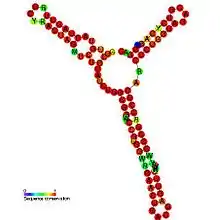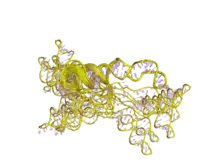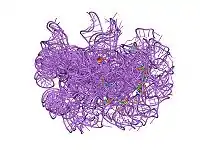Gammaretrovirus core encapsidation signal
The Gammaretrovirus core encapsidation signal is an RNA element known to be essential for stable dimerisation and efficient genome packaging during virus assembly.[1] Dimerisation of the viral RNA genomes is proposed to act as an RNA conformational switch which exposes conserved UCUG elements and enables efficient genome encapsidation.[2] The structure of this element is composed of three stem-loops. Two of the stem-loops called SL-C and SL-D form a single co-axial extend helix.
| Gammaretrovirus core encapsidation signal | |
|---|---|
 Predicted secondary structure and sequence conservation of Gammaretro_CES | |
| Identifiers | |
| Symbol | Gammaretro_CES |
| Rfam | RF00374 |
| Other data | |
| RNA type | Cis-reg |
| Domain(s) | Eukaryota; Viruses |
| SO | SO:0000233 |
| PDB structures | PDBe |

A 3D representation of a Gammaretrovirus core encapsidation signal. This is a view of the NMR structure for the 101-nucleotide core encapsidation signal of the Moloney murine leukemia virus.[1]

A 3D representation of a Gammaretrovirus. This structure shows the packaging of the dimeric genome of Moloney murine leukaemia virus, of which the encapsidation signal forms a part.[2]
See also
References
- D'Souza V, Dey A, Habib D, Summers MF (2004). "NMR structure of the 101-nucleotide core encapsidation signal of the Moloney murine leukemia virus". J Mol Biol. 337 (2): 427–442. doi:10.1016/j.jmb.2004.01.037. PMID 15003457.
- D'Souza V, Summers MF (2004). "Structural basis for packaging the dimeric genome of Moloney murine leukaemia virus". Nature. 431 (7008): 586–590. doi:10.1038/nature02944. PMID 15457265.
This article is issued from Wikipedia. The text is licensed under Creative Commons - Attribution - Sharealike. Additional terms may apply for the media files.